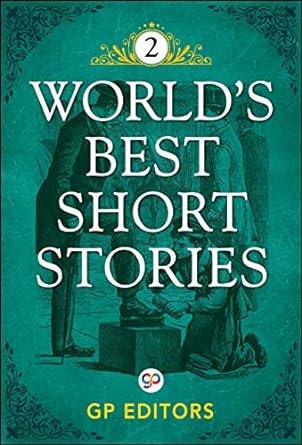
World's Best Short Stories: Volume 2
World's Best Short Stories is a collection of captivating tales from around the world, penned by some of the greatest storytellers of all time. This is a wonderful collection of famous authors and their splendid stories in ten volumes. Centuries are covered, making this a great resource for any lover of literature, English teachers and students.
The variety in style and subject is enormous, but all these stories have one point in common—the enduring quality of the writing, which places them among the masterpieces of the world’s fiction. Contributors include Leo Tolstoy, James Joyce, Edgar Allan Poe, Guy de Maupassant, Charles Dickens, Anton Chekhov, Mark Twain, Rudyard Kipling, Rabindranath Tagore, Saki, Kate Chopin and many more.
BEST DEALS
About the Author
Read Sample
Story 1 : The Princess
DH Lawrence
To her father, she was The Princess. To her Boston aunts and uncles she was just Dollie Urquhart, poor little thing.
Colin Urquhart was just a bit mad. He was of an old Scottish family, and he claimed royal blood. The blood of Scottish kings flowed in his veins. On this point, his American relatives said, he was just a bit “off”. They could not bear any more to be told which royal blood of Scotland blued his veins. The whole thing was rather ridiculous, and a sore point. The only fact they remembered was that it was not Stuart.
He was a handsome man, with a wide-open blue eye that seemed sometimes to be looking at nothing, soft black hair brushed rather low on his low, broad brow, and a very attractive body. Add to this a most beautiful speaking voice, usually rather hushed and diffident, but sometimes resonant and powerful like bronze, and you have the sum of his charms. He looked like some old Celtic hero. He looked as if he should have worn a greyish kilt and a sporran, and shown his knees. His voice came direct out of the hushed Ossianic past.
For the rest, he was one of those gentlemen of sufficient but not excessive means who fifty years ago wandered vaguely about, never arriving anywhere, never doing anything, and never definitely being anything, yet well received in the good society of more than one country.
He did not marry till he was nearly forty, and then it was a wealthy Miss Prescott, from New England. Hannah Prescott at twenty-two was fascinated by the man with the soft black hair not yet touched by grey, and the wide, rather vague blue eyes. Many women had been fascinated before her. But Colin Urquhart, by his very vagueness, had avoided any decisive connection.
Mrs. Urquhart lived three years in the mist and glamour of her husband’s presence. And then it broke her. It was like living with a fascinating spectre. About most things he was completely, even ghostly oblivious. He was always charming, courteous, perfectly gracious in that hushed, musical voice of his. But absent. When all came to all, he just wasn’t there. “Not all there,” as the vulgar say.
He was the father of the little girl she bore at the end of the first year. But this did not substantiate him the more. His very beauty and his haunting musical quality became dreadful to her after the first few months. The strange echo: he was like a living echo! His very flesh, when you touched it, did not seem quite the flesh of a real man.
Perhaps it was that he was a little bit mad. She thought it definitely the night her baby was born.
“Ah, so my little princess has come at last!” he said, in his throaty, singing Celtic voice, like a glad chant, swaying absorbed.
It was a tiny, frail baby, with wide, amazed blue eyes. They christened it Mary Henrietta. She called the little thing My Dollie. He called it always My Princess.
It was useless to fly at him. He just opened his wide blue eyes wider, and took a child-like, silent dignity there was no getting past.
Hannah Prescott had never been robust. She had no great desire to live. So when the baby was two years old she suddenly died.
The Prescotts felt a deep but unadmitted resentment against Colin Urquhart. They said he was selfish. Therefore they discontinued Hannah’s income, a month after her burial in Florence, after they had urged the father to give the child over to them, and he had courteously, musically, but quite finally refused. He treated the Prescotts as if they were not of his world, not realities to him: just casual phenomena, or gramophones, talking-machines that had to be answered. He answered them. But of their actual existence he was never once aware.
They debated having him certified unsuitable to be guardian of his own child. But that would have created a scandal. So they did the simplest thing, after all – washed their hands of him. But they wrote scrupulously to the child, and sent her modest presents of money at Christmas, and on the anniversary of the death of her mother.
To The Princess her Boston relatives were for many years just a nominal reality. She lived with her father, and he travelled continually, though in a modest way, living on his moderate income. And never going to America. The child changed nurses all the time. In Italy it was a Contadina; in India she had an ayah; in Germany she had a yellow-haired peasant girl.
Father and child were inseparable. He was not a recluse. Wherever he went he was to be seen paying formal calls going out to luncheon or to tea, rarely to dinner. And always with the child. People called her Princess Urquhart, as if that were her christened name.
She was a quick, dainty little thing with dark gold hair that went a soft brown, and wide, slightly prominent blue eyes that were at once so candid and so knowing. She was always grown up; she never really grew up. Always strangely wise, and always childish.
It was her father’s fault.
“My little Princess must never take too much notice of people and the things they say and do,” he repeated to her. “People don’t know what they are doing and saying. They chatter-chatter, and they hurt one another, and they hurt themselves very often, till they cry. But don’t take any notice, my little Princess. Because it is all nothing. Inside everybody there is another creature, a demon which doesn’t care at all. You peel away all the things they say and do and feel, as cook peels away the outside of the onions. And in the middle of everybody there is a green demon which you can’t peel away. And this green demon never changes, and it doesn’t care at all about all the things that happen to the outside leaves of the person, all the chatter-chatter, and all the husbands and wives and children, and troubles and fusses. You peel everything away from people, and there is a green, upright demon in every man and woman; and this demon is a man’s real self, and a woman’s real self. It doesn’t really care about anybody, it belongs to the demons and the primitive fairies, who never care. But, even so, there are big demons and mean demons, and splendid demonish fairies, and vulgar ones. But there are no royal fairy women left. Only you, my little Princess. You are the last of the royal race of the old people; the last, my Princess. There are no others. You and I are the last. When I am dead there will be only you. And that is why, darling, you will never care for any of the people in the world very much. Because their demons are all dwindled and vulgar. They are not royal. Only you are royal, after me. Always remember that. And always remember, it is a great secret. If you tell people, they will try to kill you, because they will envy you for being a Princess. It is our great secret, darling. I am a prince, and you a princess, of the old, old blood. And we keep our secret between us, all alone. And so, darling, you must treat all people very politely, because noblesse oblige. But you must never forget that you alone are the last of Princesses, and that all other are less than you are, less noble, more vulgar. Treat them politely and gently and kindly, darling. But you are the Princess, and they are commoners. Never try to think of them as if they were like you. They are not. You will find, always, that they are lacking, lacking in the royal touch, which only you have—”
The Princess learned her lesson early – the first lesson, of absolute reticence, the impossibility of intimacy with any other than her father; the second lesson, of naïve, slightly benevolent politeness. As a small child, something crystallised in her character, making her clear and finished, and as impervious as crystal.
“Dear child!” her hostesses said of her. “She is so quaint and old-fashioned; such a lady, poor little mite!”
She was erect, and very dainty. Always small, nearly tiny in physique, she seemed like a changeling beside her big, handsome, slightly mad father. She dressed very simply, usually in blue or delicate greys, with little collars of old Milan point, or very finely-worked linen. She had exquisite little hands, that made the piano sound like a spinet when she played. She was rather given to wearing cloaks and capes, instead of coats, out of doors, and little eighteenth-century sort of hats. Her complexion was pure apple-blossom.
She looked as if she had stepped out of a picture. But no one, to her dying day, ever knew exactly the strange picture her father had framed her in and from which she never stepped.
Her grandfather and grandmother and her Aunt Maud demanded twice to see her, once in Rome and once in Paris. Each time they were charmed, piqued, and annoyed. She was so exquisite and such a little virgin. At the same time so knowing and so oddly assured. That odd, assured touch of condescension, and the inward coldness, infuriated her American relations.
Only she really fascinated her grandfather. He was spellbound; in a way, in love with the little faultless thing. His wife would catch him brooding, musing over his grandchild, long months after the meeting, and craving to see her again. He cherished to the end the fond hope that she might come to live with him and her grandmother.
“Thank you so much, grandfather. You are so very kind. But Papa and I are such an old couple, you see, such a crochety old couple, living in a world of our own.”
Her father let her see the world – from the outside. And he let her read. When she was in her teens she read Zola and Maupassant, and with the eyes of Zola and Maupassant she looked on Paris. A little later she read Tolstoi and Dostoevsky. The latter confused her. The others, she seemed to understand with a very shrewd, canny understanding, just as she understood the Decameron stories as she read them in their old Italian, or the Nibelung poems. Strange and uncanny, she seemed to understand things in a cold light perfectly, with all the flush of fire absent. She was something like a changeling, not quite human.
This earned her, also, strange antipathies. Cabmen and railway porters, especially in Paris and Rome, would suddenly treat her with brutal rudeness, when she was alone. They seemed to look on her with sudden violent antipathy. They sensed in her curious impertinence, an easy, sterile impertinence towards the things they felt most. She was so assured, and her flower of maidenhood was so scentless. She could look at a lusty, sensual Roman cabman as if he were a sort of grotesque, to make her smile. She knew all about him, in Zola. And the peculiar condescension with which she would give him her order, as if she, frail, beautiful thing, were the only reality, and he, coarse monster, was a sort of Caliban floundering in the mud on the margin of the pool of the perfect lotus, would suddenly enrage the fellow, the real Mediterranean who prided himself on his beauté male, and to whom the phallic mystery was still the only mystery. And he would turn a terrible face on her, bully her in a brutal, coarse fashion – hideous. For to him she had only the blasphemous impertinence of her own sterility.
Encounters like these made her tremble, and made her know she must have support from the outside. The power of her spirit did not extend to these low people, and they had all the physical power. She realised an implacability of hatred in their turning on her. But she did not lose her head. She quietly paid out money and turned away.
Those were dangerous moments, though, and she learned to be prepared for them. The Princess she was, and the fairy from the North, and could never understand the volcanic phallic rage with which coarse people could turn on her in a paroxysm of hatred. They never turned on her father like that. And quite early she decided it was the New England mother in her whom they hated. Never for one minute could she see with the old Roman eyes, see herself as sterility, the barren flower taking on airs and an intolerable impertinence. This was what the Roman cabman saw in her. And he longed to crush the barren blossom. Its sexless beauty and its authority put him in a passion of brutal revolt.
When she was nineteen her grandfather died, leaving her a considerable fortune in the safe hands of responsible trustees. They would deliver her her income, but only on condition that she resided for six months in the year in the United States.
“Why should they make me conditions?” she said to her father. “I refuse to be imprisoned six months in the year in the United States. We will tell them to keep their money.”
“Let us be wise, my little Princess, let us be wise. No, we are almost poor, and we are never safe from rudeness. I cannot allow anybody to be rude to me. I hate it, I hate it!” His eyes flamed as he said it. “I could kill any man or woman who is rude to me. But we are in exile in the world. We are powerless. If we were really poor, we should be quite powerless, and then I should die. No, my Princess. Let us take their money, then they will not dare to be rude to us. Let us take it, as we put on clothes, to cover ourselves from their aggressions.”
There began a new phase, when the father and daughter spent their summers on the Great Lakes or in California, or in the South-West. The father was something of a poet, the daughter something of a painter. He wrote poems about the lakes or the redwood trees, and she made dainty drawings. He was physically a strong man, and he loved the out-of-doors. He would go off with her for days, paddling in a canoe and sleeping by a camp-fire. Frail little Princess, she was always undaunted, always undaunted. She would ride with him on horseback over the mountain trails till she was so tired she was nothing but a bodiless consciousness sitting astride her pony. But she never gave in. And at night he folded her in her blanket on a bed of balsam pine twigs, and she lay and looked at the stars unmurmuring. She was fulfilling her role.
People said to her as the years passed, and she was a woman of twenty-five, then a woman of thirty, and always the same virgin dainty Princess, ‘knowing’ in a dispassionate way, like an old woman, and utterly intact:
“Don’t you ever think what you will do when your father is no longer with you?”
She looked at her interlocutor with that cold, elfin detachment of hers:
“No, I never think of it,” she said.
She had a tiny, but exquisite little house in London, and another small, perfect house in Connecticut, each with a faithful housekeeper. Two homes, if she chose. And she knew many interesting literary and artistic people. What more?
So the years passed imperceptibly. And she had that quality of the sexless fairies, she did not change. At thirty-three she looked twenty-three.
Her father, however, was ageing, and becoming more and more queer. It was now her task to be his guardian in his private madness. He spent the last three years of life in the house in Connecticut. He was very much estranged, sometimes had fits of violence which almost killed the little Princess. Physical violence was horrible to her; it seemed to shatter her heart. But she found a woman a few years younger than herself, well-educated and sensitive, to be a sort of nurse-companion to the mad old man. So the fact of madness was never openly admitted. Miss Cummins, the companion, had a passionate loyalty to the Princess, and a curious affection, tinged with love, for the handsome, white-haired, courteous old man, who was never at all aware of his fits of violence once they had passed.
The Princess was thirty-eight years old when her father died. And quite unchanged. She was still tiny, and like a dignified, scentless flower. Her soft brownish hair, almost the colour of beaver fur, was bobbed, and fluffed softly round her apple-blossom face, that was modelled with an arched nose like a proud old Florentine portrait. In her voice, manner and bearing she was exceedingly still, like a flower that has blossomed in a shadowy place. And from her blue eyes looked out the Princess’s eternal laconic challenge, that grew almost sardonic as the years passed. She was the Princess, and sardonically she looked out on a princeless world.
She was relieved when her father died, and at the same time, it was as if everything had evaporated around her. She had lived in a sort of hot-house, in the aura of her father’s madness. Suddenly the hot-house had been removed from around her, and she was in the raw, vast, vulgar open air.
Quoi faire? What was she to do? She seemed faced with absolute nothingness. Only she had Miss Cummins, who shared with her the secret, and almost the passion for her father. In fact, the Princess felt that her passion for her mad father had in some curious way transferred itself largely to Charlotte Cummins during the last years. And now Miss Cummins was the vessel that held the passion for the dead man. She herself, the Princess, was an empty vessel.
An empty vessel in the enormous warehouse of the world.
Quoi faire? What was she to do? She felt that, since she could not evaporate into nothingness, like alcohol from an unstoppered bottle, she must do something. Never before in her life had she felt the incumbency. Never, never had she felt she must do anything. That was left to the vulgar.
Now her father was dead, she found herself on the fringe of the vulgar crowd, sharing their necessity to do something. It was a little humiliating. She felt herself becoming vulgarised. At the same time she found herself looking at men with a shrewder eye: an eye to marriage. Not that she felt any sudden interest in men, or attraction towards them. No. She was still neither interested nor attracted towards men vitally. But marriage, that peculiar abstraction, had imposed a sort of spell on her. She thought that marriage, in the blank abstract, was the thing she ought to do. That marriage implied a man she also knew. She knew all the facts. But the man seemed a property of her own mind rather than a thing in himself, another thing.
Her father died in the summer, the month after her thirty-eighth birthday. When all was over, the obvious thing to do, of course, was to travel. With Miss Cummins. The two women knew each other intimately, but they were always Miss Urquhart and Miss Cummins to one another, and a certain distance was instinctively maintained. Miss Cummins, from Philadelphia, of scholastic stock, and intelligent but untravelled, four years younger than the Princess, felt herself immensely the junior of her ‘lady’. She had a sort of passionate veneration for the Princess, who seemed to her ageless, timeless. She could not see the rows of tiny, dainty, exquisite shoes in the Princess’s cupboard without feeling a stab at the heart, a stab of tenderness and reverence, almost of awe.
Miss Cummins also was virginal, but with a look of puzzled surprise in her brown eyes. Her skin was pale and clear, her features well modelled, but there was a certain blankness in her expression, where the Princess had an odd touch of Renaissance grandeur. Miss Cummins’s voice was also hushed almost to a whisper; it was the inevitable effect of Colin Urquhart’s room. But the hushedness had a hoarse quality.
The Princess did not want to go to Europe. Her face seemed turned west. Now her father was gone, she felt she would go west, westwards, as if forever. Following, no doubt, the March of Empire, which is brought up rather short on the Pacific coast, among swarms of wallowing bathers.
No, not the Pacific coast. She would stop short of that. The South-West was less vulgar. She would go to New Mexico.
She and Miss Cummins arrived at the Rancho del Cerro Gordo towards the end of August, when the crowd was beginning to drift back east. The ranch lay by a stream on the desert some four miles from the foot of the mountains, a mile away from the Indian pueblo of San Cristobal. It was a ranch for the rich; the Princess paid thirty dollars a day for herself and Miss Cummins. But then she had a little cottage to herself, among the apple trees of the orchard, with an excellent cook. She and Miss Cummins, however, took dinner at evening in the large guest-house. For the Princess still entertained the idea of marriage.
The guests at the Rancho del Cerro Gordo were of all sorts, except the poor sort. They were practically all rich, and many were romantic. Some were charming, others were vulgar, some were movie people, quite quaint and not unattractive in their vulgarity, and many were Jews. The Princess did not care for Jews, though they were usually the most interesting to talk to. So she talked a good deal with the Jews, and painted with the artists, and rode with the young men from college, and had altogether quite a good time. And yet she felt something of a fish out of water, or a bird in the wrong forest. And marriage remained still completely in the abstract. No connecting it with any of these young men, even the nice ones.
The Princess looked just twenty-five. The freshness of her mouth, the hushed, delicate-complexioned virginity of her face gave her not a day more. Only a certain laconic look in her eyes was disconcerting. When she was forced to write her age, she put twenty-eight, making the figure two rather badly, so that it just avoided being a three.
Men hinted marriage at her. Especially boys from college suggested it from a distance. But they all failed before the look of sardonic ridicule in the Princess’s eyes. It always seemed to her rather preposterous, quite ridiculous, and a tiny bit impertinent on their part.
The only man that intrigued her at all was one of the guides, a man called Romero – Domingo Romero. It was he who had sold the ranch itself to the Wilkiesons, ten years before, for two thousand dollars. He had gone away, then reappeared at the old place. For he was the son of the old Romero, the last of the Spanish family that had owned miles of land around San Cristobal. But the coming of the white man and the failure of the vast flocks of sheep, and the fatal inertia which overcomes all men, at last, on the desert near the mountains, had finished the Romero family. The last descendants were just Mexican peasants.
Domingo, the heir, had spent his two thousand dollars, and was working for white people. He was now about thirty years old, a tall, silent fellow, with a heavy closed mouth and black eyes that looked across at one almost sullenly. From behind he was handsome, with a strong, natural body, and the back of his neck very dark and well-shapen, strong with life. But his dark face was long and heavy, almost sinister, with that peculiar heavy meaninglessness in it, characteristic of the Mexicans of his own locality. They are strong, they seem healthy. They laugh and joke with one another. But their physique and their natures seem static, as if there were nowhere, nowhere at all for their energies to go, and their faces, degenerating to misshapen heaviness, seem to have no raison d’être, no radical meaning. Waiting either to die or to be aroused into passion and hope. In some of the black eyes a queer, haunting mystic quality, sombre and a bit gruesome, the skull-and-cross-bones look of the Penitentes. They had found their raison d’être in self-torture and death-worship. Unable to wrest a positive significance for themselves from the vast, beautiful, but vindictive landscape they were born into, they turned on their own selves, and worshipped death through self-torture. The mystic gloom of this showed in their eyes.
But as a rule the dark eyes of the Mexicans were heavy and half alive, sometimes hostile, sometimes kindly, often with the fatal Indian glaze on them, or the fatal Indian glint.
Domingo Romero was almost a typical Mexican to look at, with the typical heavy, dark, long face, clean-shaven, with an almost brutally heavy mouth. His eyes were black and Indian-looking. Only, at the centre of their hopelessness was a spark of pride, or self-confidence, or dauntlessness. Just a spark in the midst of the blackness of static despair.
But this spark was the difference between him and the mass of men. It gave a certain alert sensitiveness to his bearing and a certain beauty to his appearance. He wore a low-crowned black hat, instead of the ponderous headgear of the usual Mexican, and his clothes were thinnish and graceful. Silent, aloof, almost imperceptible in the landscape, he was an admirable guide, with a startling quick intelligence that anticipated difficulties about to rise. He could cook, too, crouching over the camp-fire and moving his lean deft brown hands. The only fault he had was that he was not forthcoming, he wasn’t chatty and cosy.
“Oh, don’t send Romero with us,” the Jews would say. “One can’t get any response from him.”
Tourists come and go, but they rarely see anything, inwardly. None of them ever saw the spark at the middle of Romero’s eye; they were not alive enough to see it.
The Princess caught it one day, when she had him for a guide. She was fishing for trout in the canyon, Miss Cummins was reading a book, the horses were tied under the trees, Romero was fixing a proper fly on her line. He fixed the fly and handed her the line, looking up at her. And at that moment she caught the spark in his eye. And instantly she knew that he was a gentleman, that his ‘demon’, as her father would have said, was a fine demon. And instantly her manner towards him changed.
He had perched her on a rock over a quiet pool, beyond the cotton-wood trees. It was early September, and the canyon already cool, but the leaves of the cottonwoods were still green. The Princess stood on her rock, a small but perfectly-formed figure, wearing a soft, close grey sweater and neatly-cut grey riding-breeches, with tall black boots, her fluffy brown hair straggling from under a little grey felt hat. A woman? Not quite. A changeling of some sort, perched in outline there on the rock, in the bristling wild canyon. She knew perfectly well how to handle a line. Her father had made a fisherman of her.
Romero, in a black shirt and with loose black trousers pushed into wide black riding-boots, was fishing a little farther down. He had put his hat on a rock behind him; his dark head was bent a little forward, watching the water. He had caught three trout. From time to time he glanced up-stream at the Princess, perched there so daintily. He saw she had caught nothing.
Soon he quietly drew in his line and came up to her. His keen eye watched her line, watched her position. Then, quietly, he suggested certain changes to her, putting his sensitive brown hand before her. And he withdrew a little, and stood in silence, leaning against a tree, watching her. He was helping her across the distance. She knew it, and thrilled. And in a moment she had a bite. In two minutes she landed a good trout. She looked round at him quickly, her eyes sparkling, the colour heightened in her cheeks. And as she met his eyes a smile of greeting went over his dark face, very sudden, with an odd sweetness.
She knew he was helping her. And she felt in his presence a subtle, insidious male kindliness she had never known before waiting upon her. Her cheek flushed, and her blue eyes darkened.
After this, she always looked for him, and for that curious dark beam of a man’s kindliness which he could give her, as it were, from his chest, from his heart. It was something she had never known before.
A vague, unspoken intimacy grew up between them. She liked his voice, his appearance, his presence. His natural language was Spanish; he spoke English like a foreign language, rather slow, with a slight hesitation, but with a sad, plangent sonority lingering over from his Spanish. There was a certain subtle correctness in his appearance; he was always perfectly shaved; his hair was thick and rather long on top, but always carefully groomed behind. And his fine black cashmere shirt, his wide leather belt, his well-cut, wide black trousers going into the embroidered cowboy boots had a certain inextinguishable elegance. He wore no silver rings or buckles. Only his boots were embroidered and decorated at the top with an inlay of white suède. He seemed elegant, slender, yet he was very strong.
And at the same time, curiously, he gave her the feeling that death was not far from him. Perhaps he too was half in love with death. However that may be, the sense she had that death was not far from him made him ‘possible’ to her.
Small as she was, she was quite a good horsewoman. They gave her at the ranch a sorrel mare, very lovely in colour, and well-made, with a powerful broad neck and the hollow back that betokens a swift runner. Tansy, she was called. Her only fault was the usual mare’s failing, she was inclined to be hysterical.
So that every day the Princess set off with Miss Cummins and Romero, on horseback, riding into the mountains. Once they went camping for several days, with two more friends in the party.
“I think I like it better,” the Princess said to Romero, “when we three go alone.”
And he gave her one of his quick, transfiguring smiles.
It was curious no white man had ever showed her this capacity for subtle gentleness, this power to help her in silence across a distance, if she were fishing without success, or tired of her horse, or if Tansy suddenly got scared. It was as if Romero could send her from his heart a dark beam of succour and sustaining. She had never known this before, and it was very thrilling.
Then the smile that suddenly creased his dark face, showing the strong white teeth. It creased his face almost into a savage grotesque. And at the same time there was in it something so warm, such a dark flame of kindliness for her, she was elated into her true Princess self.
Then that vivid, latent spark in his eye, which she had seen, and which she knew he was aware she had seen. It made an inter-recognition between them, silent and delicate. Here he was delicate as a woman in this subtle inter-recognition.
And yet his presence only put to flight in her the idée fixe of ‘marriage’. For some reason, in her strange little brain, the idea of marrying him could not enter. Not for any definite reason. He was in himself a gentleman, and she had plenty of money for two. There was no actual obstacle. Nor was she conventional.
No, now she came down to it, it was as if their two ‘dæmons’ could marry, were perhaps married. Only their two selves, Miss Urquhart and Señor Domingo Romero, were for some reason incompatible. There was a peculiar subtle intimacy of inter-recognition between them. But she did not see in the least how it would lead to marriage. Almost she could more easily marry one of the nice boys from Harvard or Yale.
The time passed, and she let it pass. The end of September came, with aspens going yellow on the mountain heights, and oak-scrub going red. But as yet the cottonwoods in the valley and canyons had not changed.
“When will you go away?” Romero asked her, looking at her fixedly, with a blank black eye.
“By the end of October,” she said. “I have promised to be in Santa Barbara at the beginning of November.”
He was hiding the spark in his eye from her. But she saw the peculiar sullen thickening of his heavy mouth.
She had complained to him many times that one never saw any wild animals, except chipmunks and squirrels, and perhaps a skunk and a porcupine. Never a deer, or a bear, or a mountain lion.
“Are there no bigger animals in these mountains?” she asked, dissatisfied.
“Yes,” he said. “There are deer – I see their tracks. And I saw the tracks of a bear.”
“But why can one never see the animals themselves?” She looked dissatisfied and wistful like a child.
“Why, it’s pretty hard for you to see them. They won’t let you come close. You have to keep still, in a place where they come. Or else you have to follow their tracks a long way.”
“I can’t bear to go away till I’ve seen them: a bear, or a deer—”
The smile came suddenly on his face, indulgent.
“Well, what do you want? Do you want to go up into the mountains to some place, to wait till they come?”
“Yes,” she said, looking up at him with a sudden naïve impulse of recklessness.
And immediately his face became sombre again, responsible.
“Well,” he said, with slight irony, a touch of mockery of her. “You will have to find a house. It’s very cold at night now. You would have to stay all night in a house.”
“And there are no houses up there?” she said.
“Yes,” he replied. “There is a little shack that belongs to me, that a miner built a long time ago, looking for gold. You can go there and stay one night, and maybe you see something. Maybe! I don’t know. Maybe nothing come.”
“How much chance is there?”
“Well, I don’t know. Last time when I was there I see three deer come down to drink at the water, and I shot two raccoons. But maybe this time we don’t see anything.”
“Is there water there?” she asked.
“Yes, there is a little round pond, you know, below the spruce trees. And the water from the snow runs into it.”
“Is it far away?” she asked.
“Yes, pretty far. You see that ridge there” – and turning to the mountains he lifted his arm in the gesture which is somehow so moving, out in the West, pointing to the distance – “that ridge where there are no trees, only rock” – his black eyes were focussed on the distance, his face impassive, but as if in pain – “you go round that ridge, and along, then you come down through the spruce trees to where that cabin is. My father bought that placer claim from a miner who was broke, but nobody ever found any gold or anything, and nobody ever goes there. Too lonesome!”
The Princess watched the massive, heavy-sitting, beautiful bulk of the Rocky Mountains. It was early in October, and the aspens were already losing their gold leaves; high up, the spruce and pine seemed to be growing darker; the great flat patches of oak scrub on the heights were red like gore.
“Can I go over there?” she asked, turning to him and meeting the spark in his eye.
His face was heavy with responsibility.
“Yes,” he said, “you can go. But there’ll be snow over the ridge, and it’s awful cold, and awful lonesome.”
“I should like to go,” she said, persistent.
“All right,” he said. “You can go if you want to.”
She doubted, though, if the Wilkiesons would let her go; at least alone with Romero and Miss Cummins.
Yet an obstinacy characteristic of her nature, an obstinacy tinged perhaps with madness, had taken hold of her. She wanted to look over the mountains into their secret heart. She wanted to descend to the cabin below the spruce trees, near the tarn of bright green water. She wanted to see the wild animals move about in their wild unconsciousness.












